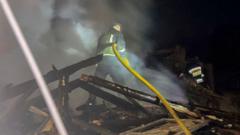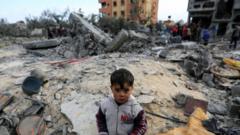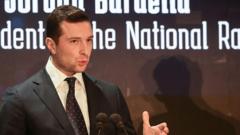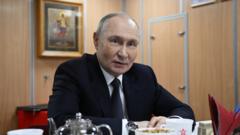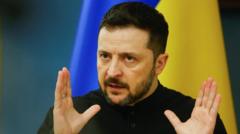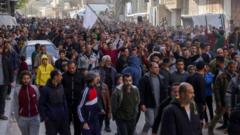The Israeli military's targeted air strike on a Hezbollah drone storage unit in Beirut has reignited tensions in the region, as both Israel and Lebanon's government declare the event a breach of the ceasefire. With ongoing rocket threats and the backing of international diplomacy, the fragile truce faces new challenges.
Tensions Escalate as Israel Strikes Beirut in Response to Rocket Fire
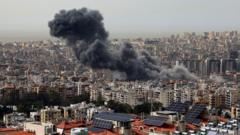
Tensions Escalate as Israel Strikes Beirut in Response to Rocket Fire
In a significant escalation, Israel has launched its first air strike on southern Beirut since the ceasefire with Hezbollah took effect in November, claiming the action was in response to a recent rocket attack from Lebanon.
In a recent development escalating tensions in the Middle East, Israel executed its first air strike in the southern suburbs of Beirut since the ceasefire with Hezbollah was established in November. The Israeli military confirmed the targeting of a drone storage facility linked to Hezbollah, following a warning issued for evacuations that prompted widespread panic among local residents.
The air strike unfolded just hours after two rockets were reportedly fired from southern Lebanon towards northern Israel, with the Israeli defense system successfully intercepting one. The other rocket reportedly failed to reach Israeli territory, with Hezbollah asserting that it was not involved in the incident. In response, Israel characterized the rocket fire as a "blatant violation" of the ceasefire terms, a sentiment echoed by Lebanon's President Joseph Aoun, who noted that the strike represents a contravention of the established agreements facilitated by France and the United States.
In a firm statement, the Israel Defense Forces (IDF) emphasized Lebanon's responsibility to uphold the ceasefire in light of the rocket attacks. Videos circulated on social media displayed residents fleeing the Hadath area as schools were ordered to evacuate amidst the looming threat.
Although Friday's air strike marks a significant moment of tension between the two sides, experts suggest that the ceasefire, which halted over a year of fierce conflict, may still endure for the time being. The current unrest underscores the Lebanese authorities' struggles to regulate militant activities in the southern regions where groups like Hezbollah operate—an entity that remains dominant alongside other Palestinian factions such as Hamas and Islamic Jihad.
Despite the established ceasefire, which had originally quelled more than 13 months of warfare that devastated communities and led to alarming civilian casualties, reports indicate that Israel has continued frequent air strikes targeting what they allege are Hezbollah-associated positions. Lebanon's officials assert that these incursions, along with Israeli military presence in various areas of southern Lebanon, violate the truce terms.
The latest round of rocket fire is the second incident within a week, as Israel had conducted earlier air strikes in response to similar aggressions. Lebanon's health ministry records indicate that previous strikes claimed lives and resulted in multiple injuries, exposing the continued volatility of the situation.
As both countries navigate the precarious balance of power and ceasefire agreements, the international community is urged to intervene and enforce the truce, with Biden administration officials and European leaders advocating for compliance from both sides. The events highlight the ongoing implications of the entrenched conflict in the region—a situation marked by a struggle for stability in a historically volatile area.







